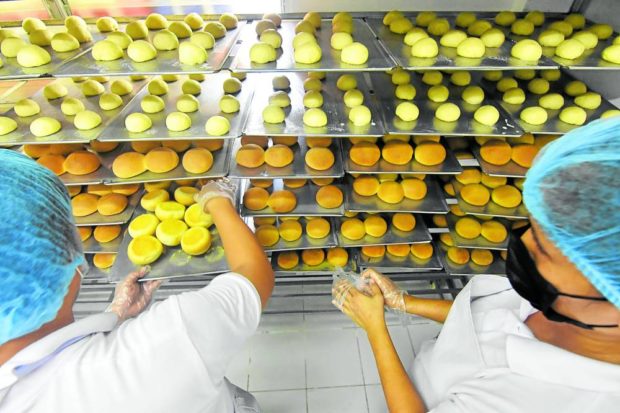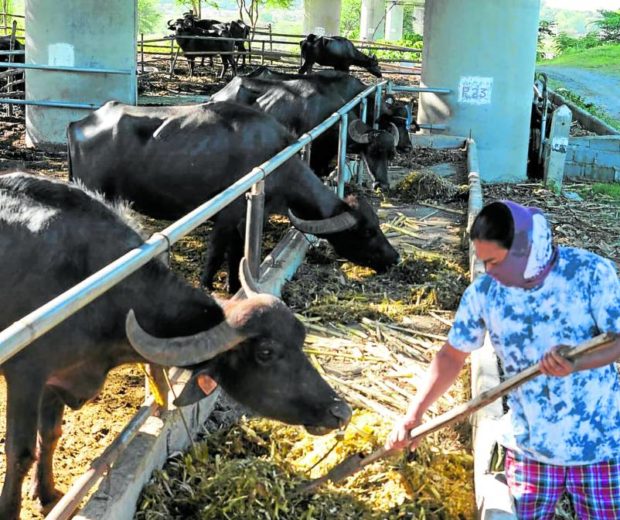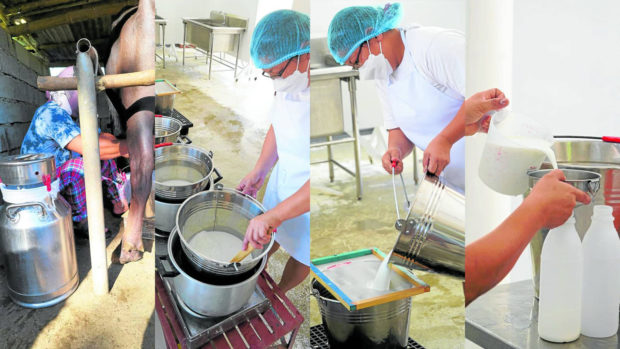Dairy farms help feed kids, fight poverty in Pangasinan

COMMUNITY BAKERY | Members of Bantog Samahang Nayon Multi-Purpose Cooperative (BSNMPC) in Asingan, Pangasinan, run a bakeshop where freshly made “milky buns” are prepared daily for local schoolchildren. (Photo by WILLIE LOMIBAO / Inquirer Northern Luzon)
ASINGAN, Pangasinan, Philippines — This agricultural town in eastern Pangasinan province may not be a land of honey, but fresh milk has been flowing from its household farms, processed at the factory managed by a cooperative, and sent daily to public elementary schools for children to drink.
Paired with the milk is a bread called “milky bun,” which is baked daily by the Bantog Samahang Nayon Multi-Purpose Cooperative (BSNMPC) to help curb the nutritional deficiencies of local schoolchildren.
The BSNMPC packs 52,800 bottles (200 milliliters each) of fresh milk and bakes 52,800 milky buns daily, supplying these to the Department of Education (DepEd) Pangasinan Division II, said cooperative chair Rolly Mateo in a recent interview.
The milk comes from the 400 dairy carabaos entrusted to 234 cooperative members who bring the milk to the cooperative center for processing into different products — pasteurized fresh milk, chocolate flavored milk, and yogurt with either strawberry, mango, and blueberry flavors with real fruit bits.
Mateo said the cooperative buys the fresh milk for P77 or P82 per liter, depending on the quality.
Article continues after this advertisement“We reject milk that does not pass the standard of quality,” Mateo said. The processed milk and yogurt are then sold at P150 a liter, P80 for half a liter, and P45 for 200 ml.
Article continues after this advertisement
The bread goes with the milk that the cooperative produces on its dairy farms and supplies to schools in eastern Pangasinan, in partnership with the Department of Education. Photo by RAY ZAMBRANO)
Earnings
Members of the cooperative are mostly farmers, single parents and recipients of the government’s cash grant programs.
The cooperative earned P4 million in just eight months last year after signing a contract with the DepEd, which has been buying milk and buns from the group since 2019.
“We hit a snag because of the pandemic in 2020, but we have bounced back,” Mateo said.
The almost 30-year-old cooperative had humble beginnings, tracing its roots to 25 members who initially engaged in raising ducks, cattle and tilapia, he said.
In 2005, the Philippine Carabao Center (PCC) encouraged the farmers, who by then had already formed a cooperative, to engage in milk production.
“But, we were hesitant as we knew nothing about that industry, and we had problems then in the cooperative,” Mateo said.
The PCC was insistent and gave 25 carabaos to the cooperative, which in turn assigned the animals to selected members.

TEDIOUS PROCESS The process of extracting milk from dairy carabaos in farms under the Bantog Samahang Nayon Multi-Purpose Cooperative in Asingan, Pangasinan, is tedious as farmers have to
do this without the aid of machines. Another team of cooperative members processes dairy products. (Photo by RAY ZAMBRANO)
Growing population
About 17 years later, the cooperative’s members have increased the population of their carabaos from 25 to 400, while the number of members has ballooned to 234. The milk processing center and the bakery employ a total of 160 residents.
Under a scheme established by the cooperative for the distribution of the carabaos, each member with a female head has to give back two animals, which will also be given to other members.
The cooperative manages to maintain the quality of the carabao by artificially inseminating the females with buffalo from Italy. The buffalo produces more milk than other hybrid cattle, according to the farmers.
Mateo said many farmers have improved their lot because of the cooperative, with one of them earning as much as P100,000 a month.
He himself said that from one animal in 2007, he now has 63 carabaos, although only 11 are lactating. “The others are still young,” he said.
More projects are coming to the cooperative, including a 6-hectare farm to house 200 carabaos.
Government support
The cooperative had decided that the new carabaos would not be turned over to the members as they have no more space in their properties. Instead, they will be raised and milked on the farm where a housing and milking facility will be built.
The cooperative, as of the moment, cannot produce enough milk to meet the increasing demand and having a farm is meant to address this problem.
Mateo admitted it was because of the government’s support that the cooperative succeeded, citing the help provided by agencies like the Department of Trade and Industry, the Department of Science and Technology, and the Department of Agriculture.
The cooperative has enough money that allows it provide a P500 “pension” to elderly members.
According to Mateo, each carabao produces an average of four liters each morning (the afternoon milk is for the baby carabao).
The more carabao a member has, the more milk he can sell to the cooperative, enabling him to earn more for his family, Mateo said.
RELATED STORIES
Plastic trash-for-rice program feeds residents, makes bricks for Angeles City
In Luzon, rich, poor join hands to feed others